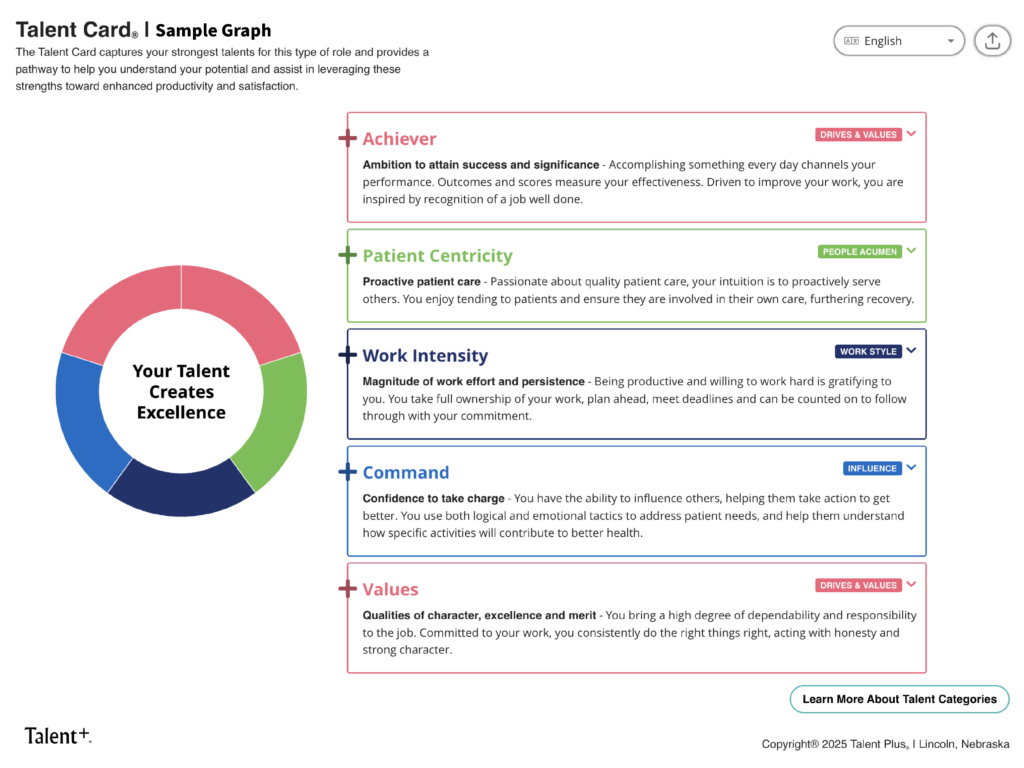
Higher revenues, organizational growth, and an aspirational vision — the fastest way to achieve these goals is through your employees, particularly in healthcare settings where nurses play a critical role. Employee development is essential for the long-term success of healthcare organizations.
Employees who feel they are being developed will produce at a higher rate than those who do not. Furthermore, 87% of Millennials say “professional or career growth and development opportunities are important to them in a job.” Unfortunately, only 29% of organizations have a clear learning development plan for their employees.
Why Do Hospitals Struggle to Develop Nurses?
Leaders must take the time to understand their nurses’ individual strengths and weaknesses, and their unique long-term aspirations. So, how do leaders assess these aspects of their nurses?
First, leaders should use a talent assessment to understand their nurses’ strengths and weaknesses. Second, they should have one-on-one career development discussions, focused on their unique career aspirations. This blog will focus specifically on recognizing talent and setting goals using talent assessments.
Use Talent Assessments to Gain a Comprehensive Understanding of Nurses
A clinical assessment that evaluates nurses’ strengths and weaknesses is essential to understanding the whole nurse. Most selection and development tools focus on the skills, knowledge and experience of nurses. While these are important to know and understand, our research shows they account for only about 50% of the variance in nurse productivity.
For a complete picture of the nurse, the key for leaders is to use a talent-based assessment. Talent assessments examine the thoughts, feelings and behaviors of nurses. These include traits like:
- Empathy
- Exactness
- Positivity
- Patient Centricity
When a leader understands these talents — the foundational, unique strengths of the nurse — a leader can use them to maximize their success and contribution to the healthcare organization.
Celebrate Your Nurses’ Talents
Leaders can focus on development with yearly goal-setting sessions with each of their direct reports. The goals should represent each nurse’s aspirations and should be based on two main aspects:
- The nurse’s talents
- Their knowledge and skills
Leaders should use assessments to understand and maximize the unique strengths of a nurse, then coach the nurse using feedback from those assessments. Talent Plus offers talent assessments for healthcare organizations and at every level of employee. For example, Talent Plus offers the Clinical Healthcare Professional Talent Online® Assessments (TOA) specifically designed for healthcare roles such as nurses.
The Talent Card Shows A Nurse’s Top 5 Talent Themes
Each of the TOA’s questions is associated with one of 10 talent themes. Once the TOA is completed, the leader and the nurse can both access a report that celebrates the nurse’s top five talent themes. This report is the Talent Card ®.

From a strengths-based approach, the Talent Card focuses on the nurse’s greatest strengths and how to grow each one. Now, it is key that the leader (and nurse) focus on developing those strengths.
All ten themes in the Clinical TOA contribute to nurses’ overall talent. But our research shows, the top five themes contribute about 75-80% of their overall strengths. Therefore, by focusing on these top five strengths, the leader and nurse will see a greater return on their investment.
Create Goals Using Each of the Top 5 Strengths
Creating goals for each strength is the most important part. The Talent Card guides the way for the leader to create these goals.
When an individual receives a Talent Card, they can click on one of the themes to expand each talent. This reveals two sections:
- How this talent may be exhibited in their work
- How to grow this talent
Each section contains three points. Using the “grow this talent” section, the leader might ask the nurse, “Which one of the three points most resonates with you as an area of opportunity?” That is, which one of the statements does the nurse want to focus on to grow, and why?
After the nurse selects the statement, they want to focus on, leaders should encourage them to follow these three steps:
- Form a goal around that statement. Formulate a relevant, timely (within a year), and attainable goal.
- Create a measurable outcome. This is key. For the goal to be successful, there must be a measurement. “Trying harder” is not enough.
- Two to four process steps to reach the goal. That is, what are the key steps to create a successful goal?
Don’t Forget to Review Goals
It is important for leaders to ask their employees to submit their goals for review. In many cases, unfortunately, nurses and leaders utilize goal-setting activities only for remedial reasons (like improving a certain skill) and fail to create a specific goal with a measurable outcome.
Instead, leaders should have quarterly follow-up meetings with their nurses to monitor the success of their goals. This helps to accelerate the nurses’ natural talents and develop them into leaders.
Use The Talent Card to Understand Strengths
With this process — having nurses identify their strengths through a talent assessment and developing their strengths through the Talent Card — nurses have an opportunity to grow their strengths and enjoy a more rewarding career.
Your healthcare organization will benefit by retaining talented, enthusiastic nurses who grow into leaders. And as always, Talent Plus is here to help you accomplish this!
Scott C. Whiteford, Ph.D.
Scott C. Whiteford, Ph.D. is the Director of Leadership Analytics at Talent Plus where his role is to partner with, listen to and find solutions for our clients, their teams and organization. With an emphasis on strengths, through selection and development, he helps our clients find success on their Talent-Based Journey.
“I focus on the strength management approach to help grow leaders and improve team and organization cultures.” – Scott Whiteford
Talents: Relationship, Ego Drive, Focus, Conceptualization and Intelligence
Latest Posts: Blog

Blog February 02, 2026
Managing Up and Down: Using Talent to Strengthen Every Working Relationship
Managing up and down is one of the most valuable skills you can have. Learn how understanding talent can make managing in both directions much easier.
Read More
Blog November 04, 2025
Top Performers, Explained: Karl Giuseffi’s Blueprint to Thrive
Explore insights from Karl Giuseffi on how talent science enhances workplace success and team performance.
Read More
Blog October 22, 2025
Practical Ways to Give Feedback That Strengthens Talent and Growth
Learn how to give good feedback that inspires and builds trust among your team while enhancing their natural strengths.
Read More
Blog September 25, 2025
What Do We Really Mean When We Talk About Talent?
Unlock the secrets of talent in the workforce. Learn how to identify inherent abilities for excellence in your team.
Read More
Blog July 08, 2025
How to Manage Difficult People
Master how to manage difficult people at work with six effective strategies for maintaining productivity and engagement.
Read More
Selection April 28, 2025
The Science of Talent Reduces Turnover in Credit Unions
Learn how Credit Unions use Talent Plus Solutions to decrease turnover, better engage employees and increase performance.
Read More
